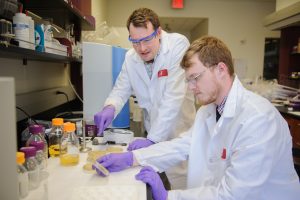
TUSCALOOSA, Ala. – Six projects designed to deepen understanding of the coronavirus pandemic and future pandemics and positively influence society will receive seed funding from The University of Alabama.
The projects come from across disciplines on campus, and were selected through the University’s Joint Institute Pandemic Pilot Project, sponsored by the UA Office for Research and Economic Development and UA’s research institutes.
“It is essential as the flagship university in the state that UA contributes to improving the lives of Alabamians in the face of this pandemic and future pandemics,” said Dr. Russell J. Mumper, vice president for research and economic development. “All of our institutes are coming together in recognition that the nature of the problem and its solutions require an inherently interdisciplinary approach.”
Support for the projects comes from the Alabama Transportation Institute, Alabama Water Institute, Alabama Life Research Institute and the UA Cyber Initiative.
The effort was guided by the strategic plan for the Office for Research and Economic Development that encourages interdisciplinary and transformative research.
Along with the viability of projects to garner external funding after being established, the review process of proposals emphasized a project’s potential to sustain beyond the current global pandemic stemming from COVID-19 and scale to other large challenges.
Projects include:
- Development of a model to track transmission of infectious diseases that can help develop testing and quarantine strategies that contain infections without locking down a region. It could also evaluate the effectiveness of stay-at-home orders. The project is led by Dr. Jun Liu, assistant professor of civil, construction and environmental engineering.
- Using a bacteria’s immune system known as CRISPR-Cas, sequences of genetic code inside bacteria that store information on invading viruses, to develop a low-cost, point-of-care test for the coronavirus that causes COVID-19. The goal is to offer an alternative diagnostic test that uses a smart phone app to detect a color change in the sample instead of the labor-intensive test used now on expensive lab equipment. The work is led by Dr. Jack Dunkle, assistant professor of chemistry and biochemistry.
- Determining if lifestyle factors such as vaccination history, diet and outdoor activity may impact severity of COVID-19 symptoms through a nationwide survey of adults younger than age 50 who recovered from a diagnosis. Survey data can be used to conduct future clinical study with blood and genes investigation. The project is led by researchers from human nutrition and hospitality management, Dr. Han-A Park, assistant professor, and Dr. Amy Ellis, associate professor.
- Exploring and understanding how adolescents and parents dealt with school closings and confinement at home during the spring and summer pandemic. The aim is understanding the differences among families in the decisions, opportunities and losses that occurred and carried forward into the next school year. The research team wants to understand the positive and negative ripple effects on children’s peer experiences and behavioral adjustment while evaluating the effectiveness of affordable school-based medical and behavioral services to support families and children. The project involves collaboration among developmental and educational psychologists, nursing educators, experts in marriage and family therapy, social work experts, and experts in evaluation and school improvement. The cross-campus research is led by Dr. Jeffrey Parker, associate professor of psychology.
- Creating a transformative training program to equip rural Alabamians with skills needed for the evolving job market since it is predicted many of the jobs lost during the pandemic will not return. The project will identify skills associated with programming jobs, conduct a needs assessment of rural communities and identify residents and community leaders willing to participate in training and development. Dr. Kimberly Stowers, assistant professor of management, leads the project.
- Assessing emergency messaging used during the pandemic in Alabama and the perceptions of the public and decision-makers of the response to messaging. Interviews, surveys and workshops with emergency managers around the state will help develop a pandemic and catastrophic event planning guide for dissemination to government officials. The project will be led by Dr. Laura Myers, director and senior research scientist at the Center for Advanced Public Safety.
Contact
Adam Jones, UA communications, 205-348-4328, adam.jones@ua.edu
